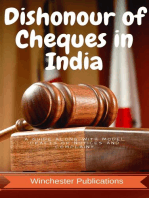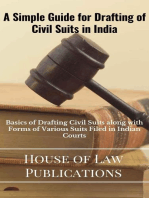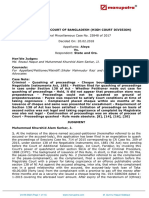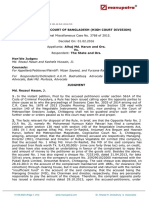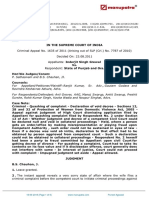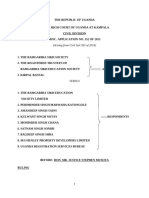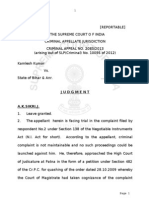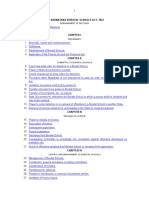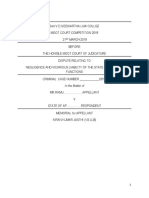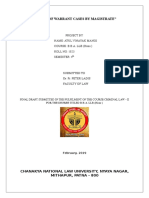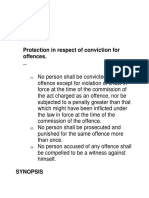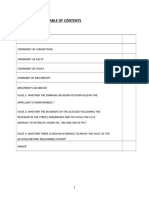0 ratings0% found this document useful (0 votes)
Aminul - Karim - MD - Vs - Government - of - Bangladesh - 67 DLR 354
Aminul - Karim - MD - Vs - Government - of - Bangladesh - 67 DLR 354
Uploaded by
majedulquaderThis document summarizes a Supreme Court of Bangladesh judgment regarding a writ petition filed by Aminul Karim against the government of Bangladesh and others. The court dismissed the petition, finding that a criminal case and civil case can proceed simultaneously even if they arise from the same transaction. Specifically, the court held that the pending civil recovery suit filed by the bank did not prevent the criminal proceeding against Karim under the Negotiable Instruments Act from continuing. The court relied on previous decisions that upheld the principle that criminal cases can be proceeded with independently of civil suits on the same facts.
Copyright:
© All Rights Reserved
Available Formats
Download as PDF, TXT or read online from Scribd
Download as pdf or txt
Aminul - Karim - MD - Vs - Government - of - Bangladesh - 67 DLR 354
Aminul - Karim - MD - Vs - Government - of - Bangladesh - 67 DLR 354
Uploaded by
majedulquader0 ratings0% found this document useful (0 votes)
This document summarizes a Supreme Court of Bangladesh judgment regarding a writ petition filed by Aminul Karim against the government of Bangladesh and others. The court dismissed the petition, finding that a criminal case and civil case can proceed simultaneously even if they arise from the same transaction. Specifically, the court held that the pending civil recovery suit filed by the bank did not prevent the criminal proceeding against Karim under the Negotiable Instruments Act from continuing. The court relied on previous decisions that upheld the principle that criminal cases can be proceeded with independently of civil suits on the same facts.
Original Title
Aminul_Karim_Md__vs__Government_of_Bangladesh_67 DLR 354
Copyright
© © All Rights Reserved
Available Formats
PDF, TXT or read online from Scribd
Share this document
Did you find this document useful?
Is this content inappropriate?
This document summarizes a Supreme Court of Bangladesh judgment regarding a writ petition filed by Aminul Karim against the government of Bangladesh and others. The court dismissed the petition, finding that a criminal case and civil case can proceed simultaneously even if they arise from the same transaction. Specifically, the court held that the pending civil recovery suit filed by the bank did not prevent the criminal proceeding against Karim under the Negotiable Instruments Act from continuing. The court relied on previous decisions that upheld the principle that criminal cases can be proceeded with independently of civil suits on the same facts.
Copyright:
© All Rights Reserved
Available Formats
Download as PDF, TXT or read online from Scribd
Download as pdf or txt
0 ratings0% found this document useful (0 votes)
Aminul - Karim - MD - Vs - Government - of - Bangladesh - 67 DLR 354
Aminul - Karim - MD - Vs - Government - of - Bangladesh - 67 DLR 354
Uploaded by
majedulquaderThis document summarizes a Supreme Court of Bangladesh judgment regarding a writ petition filed by Aminul Karim against the government of Bangladesh and others. The court dismissed the petition, finding that a criminal case and civil case can proceed simultaneously even if they arise from the same transaction. Specifically, the court held that the pending civil recovery suit filed by the bank did not prevent the criminal proceeding against Karim under the Negotiable Instruments Act from continuing. The court relied on previous decisions that upheld the principle that criminal cases can be proceeded with independently of civil suits on the same facts.
Copyright:
© All Rights Reserved
Available Formats
Download as PDF, TXT or read online from Scribd
Download as pdf or txt
You are on page 1/ 4
LEX/BDHC/0028/2015
Equivalent Citation: 67 DLR (2015) 354
IN THE SUPREME COURT OF BANGLADESH (HIGH COURT DIVISION)
Writ Petition No. 382 of 2014
Decided On: 09.03.2015
Appellants: Aminul Karim (Md.)
Vs.
Respondent: Government of Bangladesh and Ors.
Hon'ble Judges/Coram:
Md. Ashfaqul Islam and Kashefa Hussain, JJ.
JUDGMENT
Md. Ashfaqul Islam, J.
1. At the instance of the petitioner, Md Aminul Karim, this Rule Nisi was issued in the
following terms:
"Let a Rule Nisi be issued calling upon the respondents to show cause as to
why the impugned proceeding of Sessions Case No. 2452 of 2013 arising out
of CR Case No. 781 of 2013 under sections 138/140 of the Negotiable
Instrument Act, 1881 now pending before the learned Metropolitan Sessions
Judge Court, Chittagong by respondent No. 3 in addition to Artha Rin Suit for
recovery of loan amount should not be declared to have been initiated
without lawful authority and is of no legal effect. At the time of issuance of
the Rule all further proceedings of, Sessions Case No. 2452 of 2013 was
stayed by this Division.
The background leading to the Rule, in short, is that the petitioner is the Managing
Director of M/s. AK Enterprise, a private limited company/The said company availed
credit facilities of the respondent No. 3 Sonali Bank Limited, Agrabad Corporate
Branch, Chittagong and failed to adjust its loan liability. The respondent No. 3 Sonali
bank on 8-10-2013 instituted Artha Rin Suit No. 308 of 2013 before the Artha Rin
Adalat, First Court, Chittagong (hereinafter referred to as Adalat) for recovery of loan
which was sanctioned earlier in favour of the company. The petitioner himself was
impleaded as defendant No. 2 in the suit. The suit was instituted claiming Taka
45,93,80,103 which includes full amount of loan and interest.
2 . It has been further stated that respondent No. 3 as complainant on 13-5-2013
filed CR Case No. 781 of 2013 in the Court; of Chief Metropolitan Magistrate,
Chittagong under sections 138/140 of the Negotiable Instrument Act, 1881
(hereinafter referred to as Act) against the petitioner alleging an offence that
happened in the complainant's office (Sonali Bank) when the cheque was
dishonoured. According to the contents of the said complaint, the petitioner issued a
cheque of Pubali Bank, Khatungonj Branch being No. 9724939 dated 29-11-2012 for
an amount of Taka 80,00,00,000 (eighty crore only) in favour of the complainant.
Thereafter on 7-3-2013 the complainant deposited the said cheque for encashment
but the same was returned unpaid for insufficient fund. The complainant served legal
notice on 18-3-2013 upon the petitioner to pay the amount within 30 (thirty) days.
05-05-2019 (Page 1 of 4) www.manupatra.com Supreme Court Bar Library
But the petitioner did not pay off the dues. (Annexure-B).
3 . The Chief Metropolitan Magistrate, Chittagong after examination of the
complainant under section 200 of the Code of Criminal Procedure was pleased to take
cognizance against the petitioner under section 138 of the Negotiable Instrument Act
and issued summons upon the petitioner. Subsequently, the petitioner voluntarily
surrendered before the Court below and obtained bail. The Complainant bank also
filed another case against the petitioner under sections 406/420 of the Penal Code
and the proceeding was issued by the Chief Metropolitan Magistrate Court directing to
send the same to Double Mooring Police Station to treat the petition as FIR and Police
Station sent the same to the Court being Double Mooring Police Station Case No. 12
of 2013. It is at this stage the petitioner who is also an accused in the aforesaid two
criminal cases moved this Division and obtained the present Rule and order of stay.
4 . None appears for the petitioner though this writ petition came up for hearing on
different occasions.
5. From the statement of facts and the grounds of the petition it seems that the crux
of the petitioner's case is that the cheques which are the subject matter in the
criminal case were also furnished as security for discharging the loan liability of the
petitioner engendering Artha Rin Suit No. 308 of 2013 and for that reason the
continuation of the proceeding under section 138 of the Act is illegal and should be
declared to have been passed without lawful authority having no legal effect.
6. Mr. SM Kafil Uddin, the learned counsel appearing for the respondent No. 3- bank,
on the other hand, by filing affidavit-in-opposition opposes the Rule and mainly
submits that to challenge the criminal proceeding, there is a special provision in the
Code of Criminal Proceedings and the writ petition is not maintainable and the
petitioner have chosen wrong forum. In elaborating his submissions the learned
counsel further submits that the petitioner is not an aggrieved person since in the
instant petition he did not challenge any order of the Artha Rin Adalat nor he has
challenged any law rather he has taken a different course impugning the proceedings
of Sessions Case No. 2452 of 2013 arising out of CR Case No. 781 of 2013, which is
a different proceeding altogether against the petitioner. By any stretch of imagination
this proceeding which has arisen for dishonour of a cheque for insufficient fund
cannot have any bearing upon the proceeding of Artha Rin Adalat and for that reason
the same should not be stayed. The learned counsel in support of his contention
placed reliance in the decision of Majed Hossain vs. State, 17 BLC (AD) 177.
Therefore, he submits that in all fairness this Rule should be discharged outright.
7 . We have heard the learned counsel for the respondent-bank and considered his
submissions. We have also gone through the petition and other materials on record
carefully. At the very outset we would like to clear that though this writ petition
appeared in the daily cause list on several occasions but the petitioner did not turn
up ultimately. In the case of Dr. Md Shahjahan, Advocate vs The Election
Commission, LEX/BDHC/0039/2011 : 63 DLR 543 this Division held that if in any
particular case the ratio decidendi of Appellate Division applies directly or where the
case in hand has already been decided by the same Division Bench, the writ petition
can be heard on merit without hearing the petitioner.
8 . Let us now digress to the case in hand. Admittedly respondent No. 3-bank filed
the complaint case on 13-5-2013 being CR Case No. 781 of 2013 in the Court of
Chief Metropolitan Magistrate, Chittagong under sections 138/140 of the Act against
05-05-2019 (Page 2 of 4) www.manupatra.com Supreme Court Bar Library
the petitioner and it is also admitted that respondent No. 3 filed Artha Rin Suit on 8-
10-2013 being Artha Rin Suit No. 308 of 2013 which is pending before the Artha Rin
Adalat, 1st Court, Chittagong. Be it mentioned that the CR No. 781 of 2013 was filed
earlier in point of time of the Artha Rin Suit No. 308 of 2013. Now, the point that has
been advanced by the petitioner is that the cheques which are the subject matter in
the Criminal case were furnished as security for discharging the loan liability of the
petitioner engendering Artha Rin Suit No. 308 of 2013 for that reason the
continuation of the proceeding under section 138 of the Act is illegal and should be
declared to have been passed without lawful authority having no legal effect. But we
are unable to subscribe ourselves with the said point advanced in its true spirit and
purport. The proposition of law which is consistent and no longer a res integra is that
a criminal case and civil case though arising out of the same transaction can proceed
simultaneously. The case of Monzur Alam vs State 55 DLR (AD) 62 and Shamsul
Islam Chowdhury vs State 11 BLC 116 are the authorities on the point.
9 . In Monsur Alam's case our Appellate Division upheld the decision of the High
Court Division discharging the Rule arising and of section 138 of the Negotiable
Instrument Act. High Court Division while discharging the Rule did not accept the
contention that where the facts reveal that the transaction in question involves civil
liability no criminal proceeding will lie and the criminal cases are liable to be
quashed.
10. Appellate Division upheld the said decision of the High Court holding:--
"We have considered the submissions of the learned Advocate and gone
through the judgment and find no substance in the submission of the learned
Advocate since under section 138 of the Negotiable Instruments Act an
offence is committed if a cheque is dishonoured and if payment is not made
within 15 days after receipt of a legal notice. It is a settled law that criminal
proceeding can be proceeded independently of the civil suit. Moreover, since
there is a prima facie case the criminal cases cannot also be quashed.
Therefore, the High Court Division did not commit any illegality or made any
error in law by holding that the pendency of the civil suit will not be
hindrance to proceed with the criminal cases."
11. The same view have been taken in Khondaker Mahtabuddin Ahmed vs State 49
DLR (AD) 132 and in Shamsul Islam case 11 BLC 116 that there is nothing in law
precluding a criminal case on account of a civil suit pending against the petitioners
on the same facts. The criminal case stands for the offence, while the civil suit is for
realization of money. Both can stand together.
12. In the present case ratio decidendi of the decision referred to above in 77 BLC
(AD) 177 applies squarely even factually. In that decision our Appellate Division
clearly observed:
"The next point to be decided is whether a proceeding under section 138 of
the Act, 1881 would lie against the drawer of the unpaid/dishonoured
cheque(s) when it/he obtained the loan (here the accused petitioners) by
creating equitable mortgage and the complainant company had the option to
recover the loan money by selling the mortgaged property even the
cheque(s) returned unpaid as argued by Mr. Chowdhury.
A close reading of sub-section (1) of section 138 of the Act, 1881 shows that
it has noting to do with the recovery of loan amount. The whole scheme of
05-05-2019 (Page 3 of 4) www.manupatra.com Supreme Court Bar Library
the law as discussed hereinbefore, is to haul up the drawer of the
unpaid/dishonoured cheque(s) for not arranging the funds against the
issuance of such cheque(s) and then its/his failure to make the payment of
the amount of the money of the unpaid/dishonoured cheque(s) on demand
by the payee or, as the case be, by the holder in due course of the cheque(s)
in writing within thirty days of the receipt of such notice as provided in
clauses (b) and (c) respectively of sub-section (1) of section 138 of the Act,
1881..
As discussed above, an offence under section 138(1) of the Act, 1881 shall
be deemed to have been committed when any cheque(s) drawn by a person
on an account maintained by him with a banker for payment of any amount
of money to another person from out of that account is returned by the bank
unpaid for the reasons stated therein and such unpaid/dishonoured
cheque(s) gives rise to initial cause of action to the payee, or, as the case
may be, to the holder in due course of the cheque(s) for filing a petition of
complaint as provided in clause (a) of section 141 of the Act, 1881 subject to
fulfillment of the conditions as detailed in clauses (a)(b) and (c) of the
proviso to sub-section (1) of section 138 of the Act, 1981 and attain its
maturity after the drawer of such unpaid dishonoured cheque(s) fails to make
the payment of the amount of money of such cheque(s) within the period of
thirty days of the receipt of the notice served under clause (b). In this
regard, it is also significant to note that subsection (3) of section 138 of the
Act, 1881 has clearly provided that notwithstanding anything contained in
sub-sections (1) and (2) thereof, the holder of the cheque(s) shall retain his
right to establish his claim through civil Court if whole or any part of the
value of the cheque(s) remains unrealized."
13. By bringing this writ petition a feeble attempt has been made to frustrate the
complaint case tinder Negotiable Instrument Act.
14. Fortified with all these decisions which are definitely focused on the issue, we
are of the view that this writ petition is totally misconceived and bereft of any
substance whatsoever which should be discharged with cost. In the result, the Rule is
discharged with cost. The order of stay granted earlier by this Court is hereby
recalled and vacated.
Communicate this order at once.
© Manupatra Information Solutions Pvt. Ltd.
05-05-2019 (Page 4 of 4) www.manupatra.com Supreme Court Bar Library
You might also like
- Dishonour of Cheques in India: A Guide along with Model Drafts of Notices and ComplaintFrom EverandDishonour of Cheques in India: A Guide along with Model Drafts of Notices and Complaint4/5 (1)
- Most Important Questions On Indian Penal Code, 1860 Code of Criminal Procedure, 1973 Indian Evidence Act, 1872No ratings yetMost Important Questions On Indian Penal Code, 1860 Code of Criminal Procedure, 1973 Indian Evidence Act, 187222 pages
- Tipu Sultan Vs State and Ors 02122015 BDHCBDHC2015230916170154153COMb575691No ratings yetTipu Sultan Vs State and Ors 02122015 BDHCBDHC2015230916170154153COMb5756916 pages
- 70 DLR (HD) 303-Aleya - Vs - State - and - Ors - 20022018 - BDHCBDHC20182307181401103COM957349No ratings yet70 DLR (HD) 303-Aleya - Vs - State - and - Ors - 20022018 - BDHCBDHC20182307181401103COM95734910 pages
- Alhaj MD Harun and Ors Vs The State and Ors 010220BDHC20161606161409185COM797568No ratings yetAlhaj MD Harun and Ors Vs The State and Ors 010220BDHC20161606161409185COM7975686 pages
- Kulola Katwiga Vs Cherehani Marko (Civil Application No 153 of 2022) 2023 TZHC 16265 (24 March 2023)No ratings yetKulola Katwiga Vs Cherehani Marko (Civil Application No 153 of 2022) 2023 TZHC 16265 (24 March 2023)8 pages
- DS Shridhar Vs P John and Ors 13122022 TLHCTL2022061123155811209COM828571No ratings yetDS Shridhar Vs P John and Ors 13122022 TLHCTL2022061123155811209COM8285712 pages
- Laxmi Dyechem Vs State of Gujarat and Ors 27112012s120849COM825398No ratings yetLaxmi Dyechem Vs State of Gujarat and Ors 27112012s120849COM82539813 pages
- Mahesh Pahade Vs State of Madhya Pradesh 18072018 MP2018270718161920181COM187550No ratings yetMahesh Pahade Vs State of Madhya Pradesh 18072018 MP2018270718161920181COM18755013 pages
- 138 NI Quashed - Not a Signatory to ChequeNo ratings yet138 NI Quashed - Not a Signatory to Cheque3 pages
- Mundele Sunday v Pearl of Africa Travels and Tours (Civil Suit No 89 of 2011) 2014 UGCommC 110 (20 August 2014)No ratings yetMundele Sunday v Pearl of Africa Travels and Tours (Civil Suit No 89 of 2011) 2014 UGCommC 110 (20 August 2014)12 pages
- Mulli Brothers Limited V Attorney General RulingNo ratings yetMulli Brothers Limited V Attorney General Ruling4 pages
- Domestic Violence (DV) Limitation - Inderjit Singh Grewal Vs State of Punjab and Ors100% (1)Domestic Violence (DV) Limitation - Inderjit Singh Grewal Vs State of Punjab and Ors9 pages
- Whether Money Lender Not Having Valid Money Lending License Can File Dishonour of Cheque Case?No ratings yetWhether Money Lender Not Having Valid Money Lending License Can File Dishonour of Cheque Case?6 pages
- Shantilal Gulabchand Mutha Vs Tata Engineerng LocomotiveNo ratings yetShantilal Gulabchand Mutha Vs Tata Engineerng Locomotive4 pages
- Rathish Babu Unnikrishnan Vs The State Govt of NCTSC20222704221820075COM329067No ratings yetRathish Babu Unnikrishnan Vs The State Govt of NCTSC20222704221820075COM3290676 pages
- Amendment of Pleadings in Private ComplaintNo ratings yetAmendment of Pleadings in Private Complaint7 pages
- Section 138 NI Act Legal Heirs Can Challenge Conviction of Deceased ConvictNo ratings yetSection 138 NI Act Legal Heirs Can Challenge Conviction of Deceased Convict3 pages
- Pollo Italia (T) LTD Vs Euro Poultry (T) LTD 2 Others (Commercial Case No 62 of 2022) 2023 TZHCComD 208 (30 June 2023)No ratings yetPollo Italia (T) LTD Vs Euro Poultry (T) LTD 2 Others (Commercial Case No 62 of 2022) 2023 TZHCComD 208 (30 June 2023)9 pages
- Transfer of A Case For A Reason of Engaging An AdvocateNo ratings yetTransfer of A Case For A Reason of Engaging An Advocate7 pages
- Alliance Insurance Corporation Vs Tusange Kalala Mbwambo (Civil Revision No 34 of 2023) 2023 TZHC 23755 (15 December 2023)No ratings yetAlliance Insurance Corporation Vs Tusange Kalala Mbwambo (Civil Revision No 34 of 2023) 2023 TZHC 23755 (15 December 2023)10 pages
- Shirish Suresh Welling v. Smt. Sangeeta Avinash MaratheNo ratings yetShirish Suresh Welling v. Smt. Sangeeta Avinash Marathe7 pages
- EXTENSION OF TIME Adelay of Even A Single Day Must Be Counted For To Enable The Court To Exercise Its Descretion in The Applicant's FavourNo ratings yetEXTENSION OF TIME Adelay of Even A Single Day Must Be Counted For To Enable The Court To Exercise Its Descretion in The Applicant's Favour8 pages
- Eva Ibrahim vs Gloria Gady Ndossy (PC Civil Appeal 2 of 2020) 2020 pg 4 and 7No ratings yetEva Ibrahim vs Gloria Gady Ndossy (PC Civil Appeal 2 of 2020) 2020 pg 4 and 78 pages
- 1004 Solomon Selvaraj V Indrani Bhagawan Singh 3 Dec 2022 447418No ratings yet1004 Solomon Selvaraj V Indrani Bhagawan Singh 3 Dec 2022 4474184 pages
- Exf8347 DC Magnus Machona Nkomola Vs Ispector General of Police and Another (Civil Case 16 of 2022) 2023 TZHC 16378 (27 March 2023)No ratings yetExf8347 DC Magnus Machona Nkomola Vs Ispector General of Police and Another (Civil Case 16 of 2022) 2023 TZHC 16378 (27 March 2023)7 pages
- Krishna Janardhan Bhat vs Dattatraya G. Hegde on 11 January, 2008No ratings yetKrishna Janardhan Bhat vs Dattatraya G. Hegde on 11 January, 200819 pages
- Fatuma Ally Mohamed Vs Mohamed Salehe (Misc Land Application 365 of 2019) 2020 TZHCLandD 2320 (2 October 2020)No ratings yetFatuma Ally Mohamed Vs Mohamed Salehe (Misc Land Application 365 of 2019) 2020 TZHCLandD 2320 (2 October 2020)5 pages
- MIC Tanzania Limited Versus Empty Souls Production Another (Civil Appeal No 12 of 2023) 2024 TZHC 7687 (28 August 2024)No ratings yetMIC Tanzania Limited Versus Empty Souls Production Another (Civil Appeal No 12 of 2023) 2024 TZHC 7687 (28 August 2024)11 pages
- Ruling in The Matter Uganda Revenue Authority Vs Kayumba Emile OganeNo ratings yetRuling in The Matter Uganda Revenue Authority Vs Kayumba Emile Ogane10 pages
- Sri Dattatraya Versus Sharanappa 554284No ratings yetSri Dattatraya Versus Sharanappa 55428428 pages
- Misc. Appl. No. 559 of 2016 National Bank of Commerce vs. Rabia Muro NewNo ratings yetMisc. Appl. No. 559 of 2016 National Bank of Commerce vs. Rabia Muro New7 pages
- Crl.R.C. (MD) .No.589 of 2015: Printed By: Guest Page 1 of 6No ratings yetCrl.R.C. (MD) .No.589 of 2015: Printed By: Guest Page 1 of 66 pages
- Charles Richard Kombe Vs Kinondoni Munipal Council 2023 Tzca 137 23 March 2023No ratings yetCharles Richard Kombe Vs Kinondoni Munipal Council 2023 Tzca 137 23 March 20239 pages
- M/S METERS AND INSRUMENTS PVT. LTD AND ANR VS. KANCHANA MEHTA - NI Act 138 Judgment - Short NotesNo ratings yetM/S METERS AND INSRUMENTS PVT. LTD AND ANR VS. KANCHANA MEHTA - NI Act 138 Judgment - Short Notes5 pages
- Sc-48-13 Majurira Vs Tredcor (Zimbabwe) PVT LTDNo ratings yetSc-48-13 Majurira Vs Tredcor (Zimbabwe) PVT LTD6 pages
- The Ramgarhia Sikh Society Ors V The Ramgarhia Education Society Limited Ors (Misc Application No 352 of 2015) 2016 UGHCCD 12 (15 March 2016)No ratings yetThe Ramgarhia Sikh Society Ors V The Ramgarhia Education Society Limited Ors (Misc Application No 352 of 2015) 2016 UGHCCD 12 (15 March 2016)8 pages
- Kanoi_Tea_Private_Limited_vs_Principal_CommissioneIK2023220623170958142COM307249No ratings yetKanoi_Tea_Private_Limited_vs_Principal_CommissioneIK2023220623170958142COM30724917 pages
- Vimal Naryan Sharma Vs State of UP and Ors 3011202UP2021081221161542395COM851132No ratings yetVimal Naryan Sharma Vs State of UP and Ors 3011202UP2021081221161542395COM85113211 pages
- Comparative CRPC - Arrest Procedure in India and USANo ratings yetComparative CRPC - Arrest Procedure in India and USA17 pages
- Manindra Kumar Majumdar v. Emperor, 1942 SCC OnLine Cal 198No ratings yetManindra Kumar Majumdar v. Emperor, 1942 SCC OnLine Cal 1982 pages
- Section 392 of The Criminal Procedure CodeNo ratings yetSection 392 of The Criminal Procedure Code9 pages
- Meaning, Roles and Functions of A Public ProsecutorNo ratings yetMeaning, Roles and Functions of A Public Prosecutor11 pages
- The Transliterated Greek Logia, Which Has Come To Denote "The Study Of." Therefore The Term Literally Means "The Study of Crime."100% (1)The Transliterated Greek Logia, Which Has Come To Denote "The Study Of." Therefore The Term Literally Means "The Study of Crime."65 pages
- JCJ-2022 - Screening Test Question PaperNo ratings yetJCJ-2022 - Screening Test Question Paper40 pages
- Critical Analysis of Victim Compensation Schemes in India100% (2)Critical Analysis of Victim Compensation Schemes in India20 pages
- Tips For Judicial Service Examination Preparation A Guest Post by Mr. Pratik Sagar (Civil Judge, 30th Batch, Bihar) - Bharat ChughNo ratings yetTips For Judicial Service Examination Preparation A Guest Post by Mr. Pratik Sagar (Civil Judge, 30th Batch, Bihar) - Bharat Chugh10 pages
- Dishonour of Cheques in India: A Guide along with Model Drafts of Notices and ComplaintFrom EverandDishonour of Cheques in India: A Guide along with Model Drafts of Notices and Complaint
- Simple Guide for Drafting of Civil Suits in IndiaFrom EverandSimple Guide for Drafting of Civil Suits in India
- Most Important Questions On Indian Penal Code, 1860 Code of Criminal Procedure, 1973 Indian Evidence Act, 1872Most Important Questions On Indian Penal Code, 1860 Code of Criminal Procedure, 1973 Indian Evidence Act, 1872
- Tipu Sultan Vs State and Ors 02122015 BDHCBDHC2015230916170154153COMb575691Tipu Sultan Vs State and Ors 02122015 BDHCBDHC2015230916170154153COMb575691
- 70 DLR (HD) 303-Aleya - Vs - State - and - Ors - 20022018 - BDHCBDHC20182307181401103COM95734970 DLR (HD) 303-Aleya - Vs - State - and - Ors - 20022018 - BDHCBDHC20182307181401103COM957349
- Alhaj MD Harun and Ors Vs The State and Ors 010220BDHC20161606161409185COM797568Alhaj MD Harun and Ors Vs The State and Ors 010220BDHC20161606161409185COM797568
- Kulola Katwiga Vs Cherehani Marko (Civil Application No 153 of 2022) 2023 TZHC 16265 (24 March 2023)Kulola Katwiga Vs Cherehani Marko (Civil Application No 153 of 2022) 2023 TZHC 16265 (24 March 2023)
- DS Shridhar Vs P John and Ors 13122022 TLHCTL2022061123155811209COM828571DS Shridhar Vs P John and Ors 13122022 TLHCTL2022061123155811209COM828571
- Laxmi Dyechem Vs State of Gujarat and Ors 27112012s120849COM825398Laxmi Dyechem Vs State of Gujarat and Ors 27112012s120849COM825398
- Mahesh Pahade Vs State of Madhya Pradesh 18072018 MP2018270718161920181COM187550Mahesh Pahade Vs State of Madhya Pradesh 18072018 MP2018270718161920181COM187550
- Mundele Sunday v Pearl of Africa Travels and Tours (Civil Suit No 89 of 2011) 2014 UGCommC 110 (20 August 2014)Mundele Sunday v Pearl of Africa Travels and Tours (Civil Suit No 89 of 2011) 2014 UGCommC 110 (20 August 2014)
- Domestic Violence (DV) Limitation - Inderjit Singh Grewal Vs State of Punjab and OrsDomestic Violence (DV) Limitation - Inderjit Singh Grewal Vs State of Punjab and Ors
- Whether Money Lender Not Having Valid Money Lending License Can File Dishonour of Cheque Case?Whether Money Lender Not Having Valid Money Lending License Can File Dishonour of Cheque Case?
- Shantilal Gulabchand Mutha Vs Tata Engineerng LocomotiveShantilal Gulabchand Mutha Vs Tata Engineerng Locomotive
- Rathish Babu Unnikrishnan Vs The State Govt of NCTSC20222704221820075COM329067Rathish Babu Unnikrishnan Vs The State Govt of NCTSC20222704221820075COM329067
- Section 138 NI Act Legal Heirs Can Challenge Conviction of Deceased ConvictSection 138 NI Act Legal Heirs Can Challenge Conviction of Deceased Convict
- Pollo Italia (T) LTD Vs Euro Poultry (T) LTD 2 Others (Commercial Case No 62 of 2022) 2023 TZHCComD 208 (30 June 2023)Pollo Italia (T) LTD Vs Euro Poultry (T) LTD 2 Others (Commercial Case No 62 of 2022) 2023 TZHCComD 208 (30 June 2023)
- Transfer of A Case For A Reason of Engaging An AdvocateTransfer of A Case For A Reason of Engaging An Advocate
- Alliance Insurance Corporation Vs Tusange Kalala Mbwambo (Civil Revision No 34 of 2023) 2023 TZHC 23755 (15 December 2023)Alliance Insurance Corporation Vs Tusange Kalala Mbwambo (Civil Revision No 34 of 2023) 2023 TZHC 23755 (15 December 2023)
- Shirish Suresh Welling v. Smt. Sangeeta Avinash MaratheShirish Suresh Welling v. Smt. Sangeeta Avinash Marathe
- EXTENSION OF TIME Adelay of Even A Single Day Must Be Counted For To Enable The Court To Exercise Its Descretion in The Applicant's FavourEXTENSION OF TIME Adelay of Even A Single Day Must Be Counted For To Enable The Court To Exercise Its Descretion in The Applicant's Favour
- Eva Ibrahim vs Gloria Gady Ndossy (PC Civil Appeal 2 of 2020) 2020 pg 4 and 7Eva Ibrahim vs Gloria Gady Ndossy (PC Civil Appeal 2 of 2020) 2020 pg 4 and 7
- 1004 Solomon Selvaraj V Indrani Bhagawan Singh 3 Dec 2022 4474181004 Solomon Selvaraj V Indrani Bhagawan Singh 3 Dec 2022 447418
- Exf8347 DC Magnus Machona Nkomola Vs Ispector General of Police and Another (Civil Case 16 of 2022) 2023 TZHC 16378 (27 March 2023)Exf8347 DC Magnus Machona Nkomola Vs Ispector General of Police and Another (Civil Case 16 of 2022) 2023 TZHC 16378 (27 March 2023)
- Krishna Janardhan Bhat vs Dattatraya G. Hegde on 11 January, 2008Krishna Janardhan Bhat vs Dattatraya G. Hegde on 11 January, 2008
- Fatuma Ally Mohamed Vs Mohamed Salehe (Misc Land Application 365 of 2019) 2020 TZHCLandD 2320 (2 October 2020)Fatuma Ally Mohamed Vs Mohamed Salehe (Misc Land Application 365 of 2019) 2020 TZHCLandD 2320 (2 October 2020)
- MIC Tanzania Limited Versus Empty Souls Production Another (Civil Appeal No 12 of 2023) 2024 TZHC 7687 (28 August 2024)MIC Tanzania Limited Versus Empty Souls Production Another (Civil Appeal No 12 of 2023) 2024 TZHC 7687 (28 August 2024)
- Ruling in The Matter Uganda Revenue Authority Vs Kayumba Emile OganeRuling in The Matter Uganda Revenue Authority Vs Kayumba Emile Ogane
- Misc. Appl. No. 559 of 2016 National Bank of Commerce vs. Rabia Muro NewMisc. Appl. No. 559 of 2016 National Bank of Commerce vs. Rabia Muro New
- Crl.R.C. (MD) .No.589 of 2015: Printed By: Guest Page 1 of 6Crl.R.C. (MD) .No.589 of 2015: Printed By: Guest Page 1 of 6
- Charles Richard Kombe Vs Kinondoni Munipal Council 2023 Tzca 137 23 March 2023Charles Richard Kombe Vs Kinondoni Munipal Council 2023 Tzca 137 23 March 2023
- M/S METERS AND INSRUMENTS PVT. LTD AND ANR VS. KANCHANA MEHTA - NI Act 138 Judgment - Short NotesM/S METERS AND INSRUMENTS PVT. LTD AND ANR VS. KANCHANA MEHTA - NI Act 138 Judgment - Short Notes
- The Ramgarhia Sikh Society Ors V The Ramgarhia Education Society Limited Ors (Misc Application No 352 of 2015) 2016 UGHCCD 12 (15 March 2016)The Ramgarhia Sikh Society Ors V The Ramgarhia Education Society Limited Ors (Misc Application No 352 of 2015) 2016 UGHCCD 12 (15 March 2016)
- Kanoi_Tea_Private_Limited_vs_Principal_CommissioneIK2023220623170958142COM307249Kanoi_Tea_Private_Limited_vs_Principal_CommissioneIK2023220623170958142COM307249
- Vimal Naryan Sharma Vs State of UP and Ors 3011202UP2021081221161542395COM851132Vimal Naryan Sharma Vs State of UP and Ors 3011202UP2021081221161542395COM851132
- Comparative CRPC - Arrest Procedure in India and USAComparative CRPC - Arrest Procedure in India and USA
- Manindra Kumar Majumdar v. Emperor, 1942 SCC OnLine Cal 198Manindra Kumar Majumdar v. Emperor, 1942 SCC OnLine Cal 198
- Meaning, Roles and Functions of A Public ProsecutorMeaning, Roles and Functions of A Public Prosecutor
- The Transliterated Greek Logia, Which Has Come To Denote "The Study Of." Therefore The Term Literally Means "The Study of Crime."The Transliterated Greek Logia, Which Has Come To Denote "The Study Of." Therefore The Term Literally Means "The Study of Crime."
- Critical Analysis of Victim Compensation Schemes in IndiaCritical Analysis of Victim Compensation Schemes in India
- Tips For Judicial Service Examination Preparation A Guest Post by Mr. Pratik Sagar (Civil Judge, 30th Batch, Bihar) - Bharat ChughTips For Judicial Service Examination Preparation A Guest Post by Mr. Pratik Sagar (Civil Judge, 30th Batch, Bihar) - Bharat Chugh
